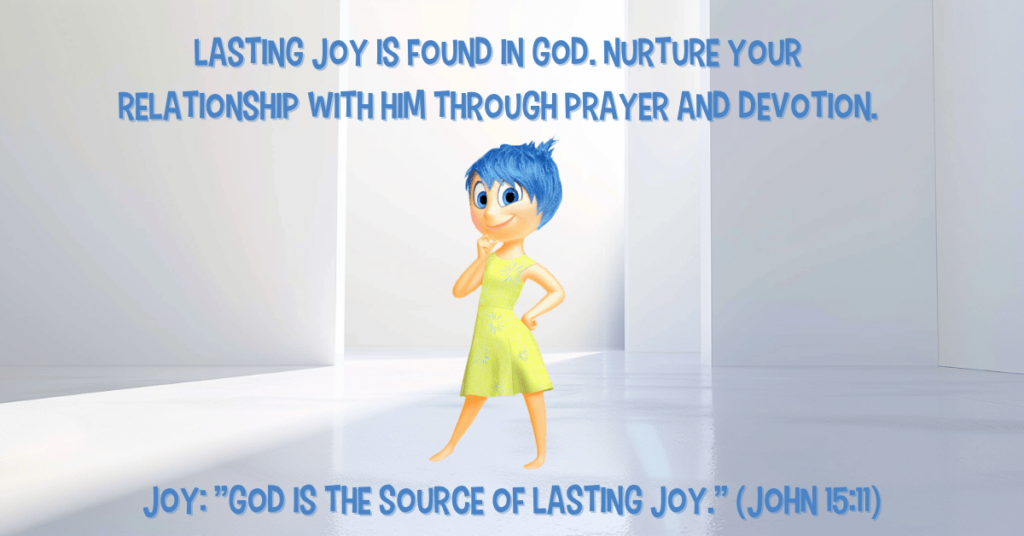
In Pixar’s heartwarming sequel, “Inside Out 2,” we journey back into the mind of a young girl, where her emotions take center stage. While this animated film is not a Gospel story, it offers a captivating exploration of human emotions, prompting us to reflect on our own emotional landscape through a Catholic lens. Today, let’s delve into nine specific emotions – anger, fear, embarrassment, disgust, joy, ennui, envy, sadness, and anxiety– and consider their significance within our faith tradition.
Anger: A Call to Justice and Reconciliation

Anger, as portrayed by the fiery red character in “Inside Out 2,” is a powerful emotion that can either fuel destruction or ignite change. As Catholics, we are reminded by Ephesians 4:26 to “be angry and do not sin.” Channeling our anger towards righteous causes, such as advocating for social justice and defending the vulnerable, aligns with the principles of Catholic Social Teaching. In our digital age, where anger often erupts on social media, let us use our voices to promote truth and reconciliation, guided by Catholic social media ethics.
Fear: Finding Solace in God’s Love

Fear, personified as a cautious and anxious character in the film, can often overwhelm us. However, Proverbs 14:27 reminds us that “the fear of the Lord is a fountain of life.” As Catholics, we recognize the importance of holy fear, a reverence for God that inspires us to live virtuous lives. In a world filled with uncertainty, we can find solace in our faith, knowing that God’s love casts out fear, as affirmed in 1 John 4:18.
Embarrassment: A Path to Humility

Embarrassment, a common human experience, can be uncomfortable and even painful. However, it can also foster humility and self-awareness, virtues cherished in our Catholic tradition. The parable of the Pharisee and the tax collector (Luke 18:9-14) reminds us that humility opens the door to God’s grace. Embracing our imperfections and seeking forgiveness through the Sacrament of Reconciliation allows us to grow in holiness.
Disgust: A Moral Compass

Disgust, while an unpleasant emotion, can serve as a moral compass, alerting us to that which is harmful or offensive. In the Gospels, Jesus expresses disgust towards the hypocrisy of the Pharisees. As Catholics, we are called to cultivate a sense of moral disgust towards sin and injustice, aligning our lives with the teachings of the Church and striving for a more just and equitable society.
Joy: A Gift from God

Joy, a radiant and exuberant emotion, is a gift from God. In the Gospel of John, Jesus desires that our joy may be full. This joy is not fleeting happiness but a deep-seated contentment that arises from our relationship with God, nourished through prayer, the sacraments, and acts of charity. Let us embrace this joy, as Pope Francis encourages us in “Evangelii Gaudium,” and share it with others as a beacon of hope in a world often marked by suffering.
Ennui: Seeking God’s Purpose

Ennui, a feeling of listlessness and dissatisfaction, can be a pervasive experience in our modern age. However, true fulfillment lies in seeking God’s purpose for our lives, as outlined in the Catechism of the Catholic Church. Ecclesiastes reminds us that all is vanity apart from God. Let ennui be a catalyst for introspection, prompting us to reassess our priorities and seek deeper meaning in our lives, perhaps through vocational discernment or spiritual practices
Envy: Gratitude and Contentment as Antidotes

Envy, a corrosive emotion that breeds resentment, is a temptation we must resist. The Ten Commandments warn us against coveting what belongs to others. As Catholics, we are called to cultivate gratitude and contentment, recognizing the blessings we have received from God. Drawing inspiration from the lives of the saints, we can find ways to overcome envy and foster a spirit of generosity.
Sadness: A Path to Healing

Sadness, a natural response to loss and disappointment, is a part of the human experience. Even Jesus wept at the tomb of Lazarus. Expressing our sadness in a healthy way can lead to healing and renewal. As Catholics, we offer comfort and support to those who grieve, drawing upon our rich tradition of spiritual direction and pastoral care.
Anxiety: Trusting in God’s Peace

Anxiety, a feeling of worry and unease, is a common experience in our fast-paced world. While it can be overwhelming, Philippians 4:6-7 encourages us, “Do not be anxious about anything, but in every situation, by prayer and petition, with thanksgiving, present your requests to God. And the peace of God, which transcends all understanding, will guard your hearts and your minds in Christ Jesus.” As Catholics, we are called to trust in God’s providence, seeking solace in prayer and the sacraments, particularly the Eucharist, which strengthens us in our daily struggles.
Conclusion
Dear friends, our emotions are not our enemies. They are part of who we are, created by God for a purpose. Let us embrace our emotions with wisdom and discernment, allowing them to guide us towards a deeper understanding of ourselves and our relationship with God. As we navigate the complexities of life, may we seek guidance through prayer, the sacraments, and the teachings of the Church.
May God bless you all, and may His love guide you in every step you take.
Amen.